Manfred Diaz
@manfreddiaz.bsky.social
2.3K followers
750 following
39 posts
Ph.D. Candidate at Mila and the University of Montreal, interested in AI/ML connections with economics, game theory, and social choice theory.
https://manfreddiaz.github.io
Posts
Media
Videos
Starter Packs
Manfred Diaz
@manfreddiaz.bsky.social
· Aug 8
Manfred Diaz
@manfreddiaz.bsky.social
· Jun 16
Manfred Diaz
@manfreddiaz.bsky.social
· Jun 5
Reposted by Manfred Diaz
Marc Lanctot
@sharky6000.bsky.social
· May 18

A Tutorial on General Evaluation of AI Agents
Artificial Intelligence (AI) and machine learning (ML), in particular, have emerged as scientific disciplines concerned with understanding and building single and multi-agent systems with the ability ...
sites.google.com
Reposted by Manfred Diaz
Joel Z Leibo
@jzleibo.bsky.social
· May 9

Societal and technological progress as sewing an ever-growing, ever-changing, patchy, and polychrome quilt
Artificial Intelligence (AI) systems are increasingly placed in positions where their decisions have real consequences, e.g., moderating online spaces, conducting research, and advising on policy. Ens...
arxiv.org
Manfred Diaz
@manfreddiaz.bsky.social
· May 1
Manfred Diaz
@manfreddiaz.bsky.social
· Apr 16
Reposted by Manfred Diaz
Reposted by Manfred Diaz
Manfred Diaz
@manfreddiaz.bsky.social
· Mar 6
Manfred Diaz
@manfreddiaz.bsky.social
· Mar 4
Marc Lanctot
@sharky6000.bsky.social
· Mar 4

A Tutorial on General Evaluation of AI Agents
Artificial Intelligence (AI) and machine learning (ML), in particular, have emerged as scientific disciplines concerned with understanding and building single and multi-agent systems with the ability ...
sites.google.com
Manfred Diaz
@manfreddiaz.bsky.social
· Mar 4
Manfred Diaz
@manfreddiaz.bsky.social
· Mar 4
Manfred Diaz
@manfreddiaz.bsky.social
· Feb 25
Manfred Diaz
@manfreddiaz.bsky.social
· Feb 25
Manfred Diaz
@manfreddiaz.bsky.social
· Feb 25
Reposted by Manfred Diaz
Marc Lanctot
@sharky6000.bsky.social
· Feb 24
Manfred Diaz
@manfreddiaz.bsky.social
· Feb 20
Manfred Diaz
@manfreddiaz.bsky.social
· Feb 12




